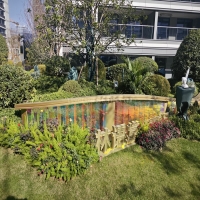Welcome to the website for landscape facilities products and knowledge.
How does the bin’s design accommodate users who may have visual impairments or other disabilities?
Modern bin designs are increasingly incorporating features to ensure accessibility for users with visual impairments or other disabilities. One key element is the use of tactile indicators, such as raised symbols or Braille labels, to help individuals identify recycling, compost, and trash compartments by touch.
High-contrast colors and bold patterns are another critical design choice, making bins easily distinguishable for those with low vision. For example, bright yellow lids for recycling or green for compost provide clear visual cues.
Ergonomic designs, like pedal-operated lids or sensor-based openings, reduce physical strain for users with mobility challenges. Additionally, audible signals or voice prompts in smart bins can guide visually impaired users during disposal.
By prioritizing inclusivity, these innovative designs ensure waste management systems are usable for everyone, promoting independence and environmental responsibility.
Related search:

Recommendation
Metal and acrylic color-changing combined curtain wall for large-scale public landscape facilities